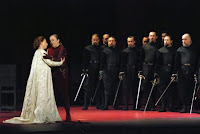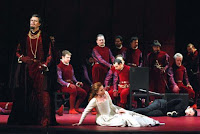After the fussiness of Hugo de Ana's "concept" Medea, Robert Carsen's Capuleti was a revelation as to what can be done when a director has a straight forward desire to tell us the composer and librettist's story. Carsen's production, from the Bastille Opera, is simple, elegant and lets Bellini's music guide the drama. Michael Levine's arrangement of walls in a deep, almost blood, red allowed the action to move forward without pause and his Renaissance inspired costumes - again in deep reds for the Capuleti, black for the Montecchi, off-white for Guiletta - were simple but beautiful.
 The libretto that Felice Romano gave Vincenzo Bellini to set is based on the early Italian tellings of the story of the ill-fated lovers rather than the more familiar Shakespeare version. There is no Mercutio to steal the limelight from Romeo, no Nurse vainly attempting to amuse us and Tybalt is Giulietta's intended not her cousin, Friar Lawrence has become the family doctor and friend. The action moves swiftly and at times almost violently - confrontation is always at the fore. And Carsen emphasises it when the curtain rises on rows of rapiers embedded in the stage floor being retrieved by Capuleti retainers as they prepare for a war council. Even as the curtain falls the two warring sides confront each other, swords drawn, over the bodies of the dead lovers. Unlike in Shakespeare the two sides have not buried their enmity.
The libretto that Felice Romano gave Vincenzo Bellini to set is based on the early Italian tellings of the story of the ill-fated lovers rather than the more familiar Shakespeare version. There is no Mercutio to steal the limelight from Romeo, no Nurse vainly attempting to amuse us and Tybalt is Giulietta's intended not her cousin, Friar Lawrence has become the family doctor and friend. The action moves swiftly and at times almost violently - confrontation is always at the fore. And Carsen emphasises it when the curtain rises on rows of rapiers embedded in the stage floor being retrieved by Capuleti retainers as they prepare for a war council. Even as the curtain falls the two warring sides confront each other, swords drawn, over the bodies of the dead lovers. Unlike in Shakespeare the two sides have not buried their enmity. I will have to admit that Bellini is not one of my favorite composers, I find his music is often dull or perhaps just too romantic for my taste. But Capuleti is an exception: the music has a drive and drama that I find lacking in his other works. Though I will probably be racked for saying this, I prefer Capuleti to anything else he wrote - yes I'm including Norma in that statement.
I will have to admit that Bellini is not one of my favorite composers, I find his music is often dull or perhaps just too romantic for my taste. But Capuleti is an exception: the music has a drive and drama that I find lacking in his other works. Though I will probably be racked for saying this, I prefer Capuleti to anything else he wrote - yes I'm including Norma in that statement.The one thing you can count on in Bellini is that the writing for his women will be both beautiful and demanding. Giulietta was written for a soprano and Romeo is a travisti role written for a mezzo and their duets are the great centre pieces of the work. And so they proved to be when sung by Mariella Devia and Sonia Ganassi.
 I've written before about the remarkable Mariella Devia, one of the greatest bel canto singers active today, and though she seemed to be having a bit of an off-night, I'll take her off-night to many other singers good nights anytime. Oh! quante volte lacked the freedom and sheer brilliance of her concert performance in Rome back in September As the evening progressed and she launched into the big duets with Ganassi's Romeo her voice became freer and regained its familiar lustre.
I've written before about the remarkable Mariella Devia, one of the greatest bel canto singers active today, and though she seemed to be having a bit of an off-night, I'll take her off-night to many other singers good nights anytime. Oh! quante volte lacked the freedom and sheer brilliance of her concert performance in Rome back in September As the evening progressed and she launched into the big duets with Ganassi's Romeo her voice became freer and regained its familiar lustre.Ganassi was the star of the evening; though physically she may not look the fearless leader of a warring household demanded by Romani, she was in total command of the stage.
 Her second act lament was gut-wrenching in its simplicity and intensity and in the duet that followed tenor Dario Schmunck matched her in a manner that was a surprise after his lacklustre delivery of Tebaldo's first act aria. In the final scene Ganassi and Devia (now completely on form) showed us the drama that can be achieved by two singers in perfect command of their art. It was breathtaking and heartbreaking.
Her second act lament was gut-wrenching in its simplicity and intensity and in the duet that followed tenor Dario Schmunck matched her in a manner that was a surprise after his lacklustre delivery of Tebaldo's first act aria. In the final scene Ganassi and Devia (now completely on form) showed us the drama that can be achieved by two singers in perfect command of their art. It was breathtaking and heartbreaking.Conductor Donato Renzetti, in a well-judged reading, allowed the singers plenty of breathing room for the grand lyrical passages but knew when to push the drama onward. And the recent retrenching of forces - administratively and artistically - at the Carlo Felice showed well in the work of both orchestra and male chorus, not always a given in Italian opera houses.
One final thought. I would have like to have seen both the Medea and Capuleti in more a traditional Italian opera house - that is the horseshoe palci/poltroni style auditorium. Torino and Genova have modern houses designed in the North American amphitheatre model and I found it robbed both works of an intimacy that I have come to appreciate over the past year or so of opera going here.
Production photos from Teatro Carlo Felice by Jacopo Morando.
30 novembre - San Andrea apostolo
No comments:
Post a Comment